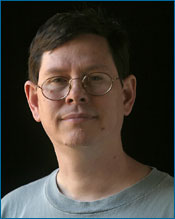The work of Andy Ellington
by the Understanding Evolution team

With his secure defense research facility, robotics lab, and fleet of researchers, University of Texas professor Dr. Andy Ellington might appear to be a CIA scientist building the latest intelligence gadgets for modern day 007s. In fact, Andy Ellington studies evolution. A self-described evolutionary engineer, he uses evolutionary principles to evolve molecules and organisms that serve all sorts of functions: from warning us of a chemical weapons attack to fighting HIV to detecting cancer. Said Ellington, “I don’t make the molecule; I don’t make the organism — I make them better.”
Surprisingly, Andy’s first research focus was not biotechnology, but the origin of life. How did a scientist whose burning interest lies in the billion-year old chemical reactions of the primordial soup wind up running a lab of 50 people with millions of dollars in research grants? Although a fascinating issue, the origin of life typically does not attract much in terms of research funds. Nevertheless, to Andy, the connection between origins research and evolutionary engineering is clear: “The same type of processes that would have led to functional molecules at or near origins are the processes that I use to make biosensors for military or homeland defense.”
In this research profile, we will explore these key questions:
- How does studying the origin of life help us solve real world problems today?
- What conditions are required for natural or artificial selection to occur?
- How do researchers use evolution to engineer useful molecules?
Get tips for using research profiles, like this one, with your students.
